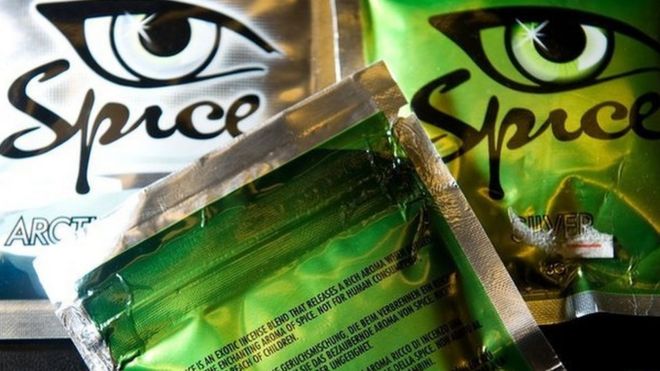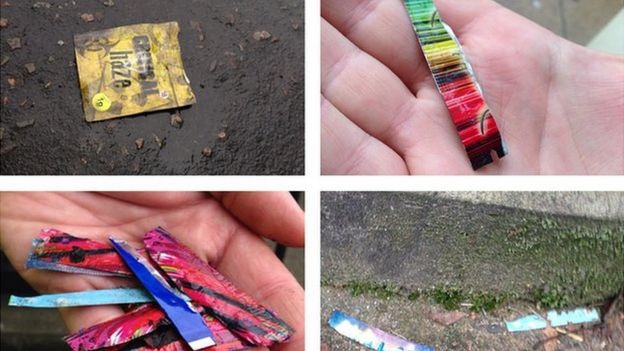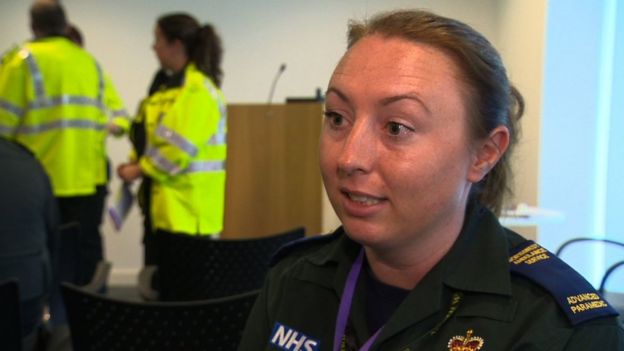Paramedics 'baffled' by legal highs, as police incidents rise
- 25 October 2015
- England
 AFP/Getty
AFP/Getty
A senior paramedic has warned that so-called legal highs are leaving ambulance services baffled when it comes to treating casualties.
Sarah Harrison said the complex make-up of the substances is leaving staff playing "catch-up" in the battle to develop effective treatments.
A BBC investigation has discovered some products did not contain the precise ingredients listed on their packaging.
Police incidents involving legal highs have more than doubled in two years.
Officers from 32 forces in England attended 3,807 incidents in 2014 - up from 1,431 the previous year, according to data compiled by the think tank the Centre for Social Justice.
Ms Harrison, an advanced paramedic for North West Ambulance Service, said health workers are also seeing a surge in the number of people falling ill after taking legal highs, officially classed as new psychoactive substances (NPS).
She said: "We have no drugs that counteract the effects of the substances that people are taking, and that's what's causing a lot of the problems.
"A lot of the time we are not aware what substance they have taken and what combination, or even what the substance is because they come with different names and different street names.
"So we are having to just deal with the medical effects and treat the patient at the time."

What are legal highs?
- Legal highs produce the same, or similar effects, to drugs such as cocaine and ecstasy, but are not controlled under the Misuse of Drugs Act
- In many cases, they are designed to mimic class A drugs, but are structurally different enough to avoid being classified as illegal, so it is legal to possess and use them
- They cannot be sold for human consumption, but are often given labels such as "plant food" to get around the law
- The chemicals are made on an industrial scale in countries like China and India and then packaged and distributed throughout Europe
BBC Inside Out North West asked biochemists from Liverpool John Moores University to analyse five separate brands of legal high, marketed as Ching, Cherry Bomb, Pandora's Box Unleashed, Gogaine and Exodus Damnation.
In three of the products they discovered a mismatch between the ingredients listed on the packet, and what the substance actually contained.
While none of the products contained controlled drugs, in some cases they showed traces of additional legal chemicals not listed on the packaging.
And the Ching legal high actually had an illegal drug listed on the packet, whereas the drug inside was legal.
Prof Harry Sumnall said: "This has implications for the retailer because under current UK law, you can't pass something off as an illegal drug, even if what you are actually selling is legal.
"So in effect, the individual who was selling this product could be actually arrested and charged for the supply of an illegal drug."
He added: "I think this really shows the complexities around this - that many purchasers and many retailers as well don't really know what they are buying."

Only Gogaine and Cherry Bomb contained the precise ingredients advertised.
Prof Sumnall added that although none of the legal highs showed traces of illegal drugs, these had been detected in previous tests of other products.
The government is planning to bring in new legislation to make it an offence to produce, supply, import or export legal highs.
The Psychoactive Substances Bill is currently being debated in Parliament and is likely to come into force in spring 2016.
However, paramedic Ms Harrison said she does not think the use of legal highs will ever be adequately controlled.
"We are seeing the effects of people stopping breathing, dying, becoming unconscious, becoming extremely paranoid and then that's causing problems with the family as well - upsetting other family members, being violent and aggressive towards other members of the public," she said.
"Because [the ingredients in the drugs] are changing all the time, I don't think we can ever really get on top of it.
"I think the main message is to not take the substances in the first place."
The BBC's investigation into legal highs features on Inside Out North West, on BBC One at 19.30 GMT on Monday 26 October.
No comments:
Post a Comment
Please leave a comment-- or suggestions, particularly of topics and places you'd like to see covered